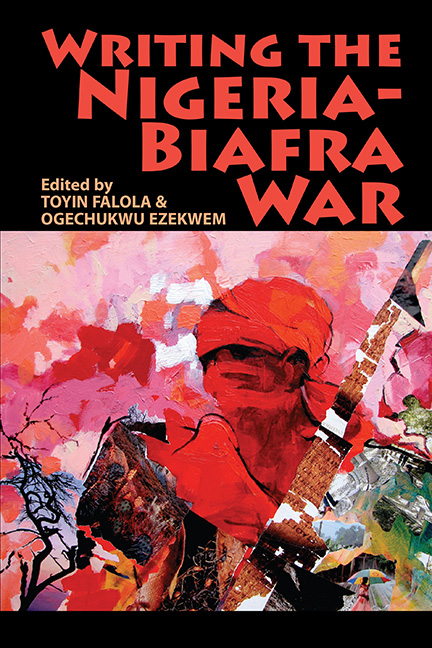Book contents
- Frontmatter
- Contents
- Notes on Contributors
- List of Abbreviations
- Timeline
- Map of Biafra 30 May 1967 – 1 May 1969
- 1 Scholarly Trends, Issues, and Themes: Introduction
- Part I On The History Of The Nigeria-Biafra War
- Part II Critical Debates On The Nigerian Crisis
- Part III The War In Fiction, Memoir, And Imagination
- Part IV Locating Gender In Nigeria-Biafra War Literature
- Select Bibliography
- Index
8 - Literary Separatism: Ethnic Balkanization in Nigeria-Biafra War Narratives
Published online by Cambridge University Press: 17 June 2021
- Frontmatter
- Contents
- Notes on Contributors
- List of Abbreviations
- Timeline
- Map of Biafra 30 May 1967 – 1 May 1969
- 1 Scholarly Trends, Issues, and Themes: Introduction
- Part I On The History Of The Nigeria-Biafra War
- Part II Critical Debates On The Nigerian Crisis
- Part III The War In Fiction, Memoir, And Imagination
- Part IV Locating Gender In Nigeria-Biafra War Literature
- Select Bibliography
- Index
Summary
Introduction
‘We remember differently’. Such were the words Chimamanda Ngozi Adichie used in her review of Chinua Achebe's very last literary work, There Was a Country. Indeed, when it comes to the tragic and painful events that culminated in the civil war and their aftermath, we hardly remember the same way, due to our differences. The critical questions, in my opinion, are the following. How have and why do we remember differently? Is it a case of differences in perspective? Or, is it because of some ulterior motive, which might be sinister and/or self-serving – in other words, a deliberate attempt to rewrite history? This underlines the importance of memory, which shapes the nature of and trend in one’s knowledge, understanding and interpretation of the past and its meaning, particularly as we are essentially what we remember and know. In other words, while what has happened cannot be changed, through controlled measures its meaning can. This is so because the power to remember in particular ways lies within humans, and narratives are the primary forms and means through which to achieve this goal.
Writing on wars has always been fashionable and attractive for many writers all through the ages, and the Nigeria-Biafra War is clearly not an exception. From the period leading to the end of that war to the present day, there has been a flurry of literature – histories, biographies, autobiographies, diaries, memoirs, political accounts, newspaper stories, etc. – by diverse writers who have produced both fictional and presumably ‘factual’ accounts of the war. For instance, Laurie Wiseberg noted that from 1968 to 1969, many speculated on whether more blood or more ink was being spilt on the battlefronts. The result is not surprising, as polemic flows more swiftly and more voluminously than actual scholarship. Aptly underlining the nature and importance of this seeming ‘scholarly tragedy’ that has befallen the Nigeria-Biafra War historiographical narratives, Gavin Williams appropriately opined that
the events leading to the Biafran secession and the Nigerian Civil War itself were the most tragic and important in the history of Nigeria. They have also been silenced. Much is forgotten; what little is remembered is selectively constructed, as was much written at the time. There were fine analytical accounts and copious documentations of these events published in the early 1970s. Since then accounts have mainly been revived to serve current political purposes.
- Type
- Chapter
- Information
- Writing the Nigeria-Biafra War , pp. 166 - 193Publisher: Boydell & BrewerPrint publication year: 2016

